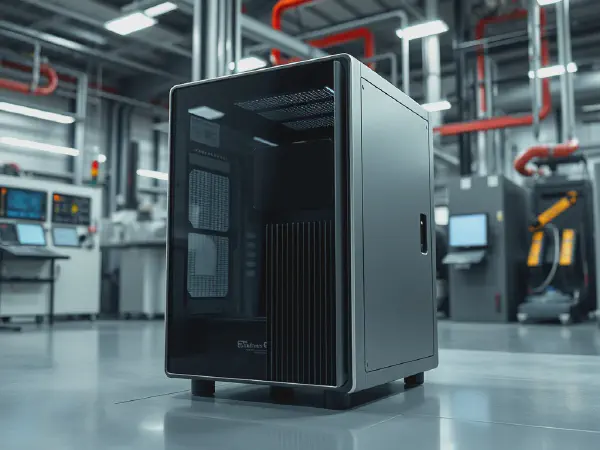Exploring Fanless Industrial PCs: Efficiency & Benefits

A Comprehensive Guide to Fanless Industrial PCs
Fanless Industrial PCs are optimized computing solutions specifically designed for rigorous industrial environments. With no moving parts, these machines excel in durability and reliability, operating seamlessly in conditions that would typically disrupt traditional PCs. The absence of fans means less dust accumulation, reducing maintenance and ensuring continuous operation in challenging settings.
The innovative design of Fanless Industrial PCs also allows them to operate quietly, making them ideal for environments where noise reduction is crucial. Industries such as manufacturing, healthcare, and smart building systems benefit significantly from these compact yet powerful devices. By leveraging advanced cooling technologies, these PCs maintain optimal performance while minimizing energy consumption and heat generation.
Fanless Industrial PCs are equipped to handle various applications ranging from automation to transportation and healthcare. Their robust construction and high resistance to environmental factors like extreme temperatures, vibrations, and moisture make them suitable for deployment everywhere. Furthermore, their energy-efficient designs result in lower operational costs over time. This article delves into the multitude of benefits and applications of Fanless Industrial PCs.
Utilizing a pdf data logger allows for more efficient data collection and analysis in research and industrial applications.
In the burgeoning landscape of industrial computing, Fanless Industrial PCs provide a forward-looking solution tailored to evolving needs. As industries increasingly prioritize sustainability and energy efficiency, these systems offer a compelling advantage. Their reliability, coupled with a variety of configurations, allows businesses to select systems that best meet their operational requirements while fostering a greener footprint.
As we explore the benefits, applications, and considerations surrounding Fanless Industrial PCs, you'll gain insight into why they are becoming a preferred choice for many industries today.
Benefits of Fanless Industrial PCs
Durability and longevity in harsh environments characterize the benefits of Fanless Industrial PCs. Without cooling fans, these devices are less susceptible to wear and tear, making them ideal for environments filled with dust, moisture, and temperature fluctuations. Their fanless designs enhance reliability, leading to prolonged service life and reduced risks of hardware failures.
Energy efficiency stands out as another advantage. Fanless Industrial PCs consume less power thanks to their passive cooling systems, leading to lower electricity bills and a smaller carbon footprint. This aspect is increasingly crucial in today's eco-conscious landscape, where sustainability figures prominently in business decisions.
Investing in a reliable 3 phase power logger enables accurate monitoring of electrical systems, ensuring better performance and energy efficiency.
Reduced noise levels for quiet operation make Fanless Industrial PCs especially appealing in noise-sensitive environments such as healthcare facilities. The silent operation facilitates a calm and comfortable atmosphere, essential for patient recovery and staff efficiency.
A silicone keyboard not only enhances typing comfort, but also offers durability and easy cleaning for busy professionals.
Lower maintenance costs derived from fewer moving parts further enhance the appeal of Fanless Industrial PCs. With no fans to replace or clean, businesses can enjoy reduced downtime and lower operational costs. Their sturdy designs lead to fewer repairs, making them cost-effective solutions for industrial applications.
Applications of Fanless Industrial PCs
Fanless Industrial PCs play a pivotal role in manufacturing automation. Their ability to withstand harsh conditions ensures that production lines remain operational without interruptions. These PCs can control robotics, monitor processes, and gather data, improving productivity and efficiency across manufacturing sectors.
Integration in smart building systems is another significant application for Fanless Industrial PCs. These devices manage HVAC, lighting, and security systems, ensuring optimal comfort and safety in commercial buildings while using less energy.
Deployment in transportation and logistics speaks to the versatility of Fanless Industrial PCs. They can be used for real-time data monitoring, route optimization, and fleet management, ensuring that logistics operations are efficient and responsive to changing demands.
In medical equipment and healthcare facilities, Fanless Industrial PCs guarantee reliability and precise data handling. They are used in imaging systems, laboratory automation, and patient monitoring devices, where accuracy and durability are paramount.
Comparison with Traditional Industrial PCs
Thermal management in fanless designs marks a notable contrast with traditional industrial PCs. While conventional PCs use fans to dissipate heat, Fanless Industrial PCs rely on passive cooling techniques, allowing for quieter and more energy-efficient operation.
Weight and size advantages are distinctly evident. Fanless Industrial PCs are typically more compact and lightweight than their traditional counterparts, making them easier to install and integrate within existing setups, particularly in space-constrained environments.
Noise levels in industrial settings further highlight the benefits of Fanless Industrial PCs. While traditional PCs may produce significant noise due to fan operation, fanless designs ensure a quiet working environment, essential in operations where noise reduction is critical.
Overall performance metrics also favor Fanless Industrial PCs. Advances in processor technology enable fanless systems to deliver superior performance without the thermal overhead associated with traditional cooling methods, ensuring that they can handle complex industrial tasks efficiently.
Choosing the Right Fanless Industrial PC
When selecting a Fanless Industrial PC, key specifications to consider include CPU performance, RAM capacity, connectivity options, and storage solutions. Identifying the specific needs of the intended application helps in pinpointing the right configuration that ensures maximum efficiency.
Recommended brands and models often highlight those known for reliability and performance in industrial settings. Brands such as Advantech, OnLogic, and Axiomtek have established a reputation for producing reliable fanless solutions that meet industry standards.
Customization options for specific needs enhance the appeal of Fanless Industrial PCs. Many manufacturers provide configurable options allowing businesses to tailor systems that fit their precise requirements, including additional ports, storage expansions, or rugged housing.
Future-proofing your industrial PC choice involves selecting systems that accommodate emerging technologies. Opting for models capable of supporting upcoming standards ensures long-term viability and efficiency as technology continues to evolve.
Challenges and Considerations
Limitations in processing power can be a challenge when choosing Fanless Industrial PCs. While many models provide sufficient power for standard applications, those requiring high-performance computing might find fanless solutions lacking compared to traditional units with robust cooling systems.
Heating issues in high-load situations warrant consideration. Although fanless designs have advanced thermal management, they may still face overheating problems in environments demanding intensive computational tasks, necessitating careful monitoring.
Selecting appropriate materials for design is crucial in ensuring robustness. Fanless Industrial PCs should be constructed from materials capable of withstanding industrial conditions, including exposure to chemicals, moisture, and extreme temperatures.
Understanding warranty and support options reinforces the value of purchasing a Fanless Industrial PC. As industry-specific needs arise, having a reliable support structure can dictate the overall satisfaction and performance of the chosen solution.
